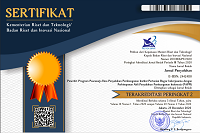Perbedaan Tahapan Pembelajaran Sekolah Lapang Pengelolaan Tanaman Terpadu Padi Sawah antar Komunitas Petani di Lampung
Abstract
Enhancement of paddies production in Lampung done with implementation of agriculture technology innovation. The effort done with farmer field school of integrated crops management (FFS-ICM) of paddies. The learning of field school occured on various ethnic community of rice farmers. The effectivity of learning process can be occured with impersonation by the stages of attention, retention, behavior production process and motivation. The purpose of this study to analyze the difference effectiveness of learning farmer field school for farmers from ethnic Lampung, Java and Bali. The research methods with survey on rice farmers FFS-ICM of paddies participant. The sample total 286 farmers.The research located in Lampung. The research carried out Juni-September 2013. The data analysis done with the difference variance. The result indicate that only the motivate stages of process learning FFS-ICM between Bali-Java ethnic shows that the obvious difference.That implications need a preparation of learning material which capable to increase farmers motivation, need an improvement empowerment of farmers group, empowering figure roles and farmer society figures.
Keywords: stages of learning, farmer field school, paddies, Lampung-Bali-Java ethnic
Downloads
Authors who publish with this journal agree to the following terms:
- Authors retain copyright and grant the journal right of first publication with the work simultaneously licensed under a

This work is licensed under a Creative Commons Attribution 4.0 International License that allows others to share the work with an acknowledgement of the work's authorship and initial publication in this journal. - Authors are able to enter into separate, additional contractual arrangements for the non-exclusive distribution of the journal's published version of the work (e.g., post it to an institutional repository or publish it in a book), with an acknowledgement of its initial publication in this journal.
- Authors are permitted and encouraged to post their work online (e.g., in institutional repositories or on their website) prior to and during the submission process, as it can lead to productive exchanges, as well as earlier and greater citation of published work (See The Effect of Open Access).















